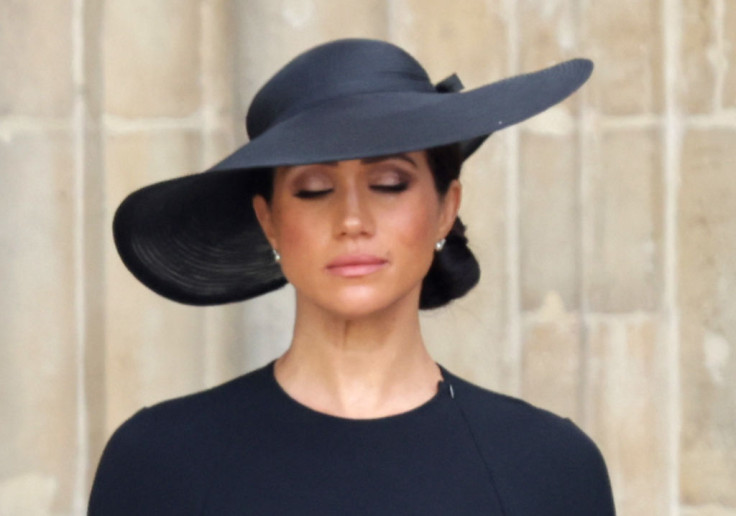Meghan Markle Slammed On Twitter For Identifying As Black: 'She Will Never Represent Black Women'

KEY POINTS
- Meghan Markle discussed the "angry Black woman" stereotype on Tuesday's episode of her "Archetypes" podcast
- Some Twitter users took issue with the former "Suits" star calling herself a Black woman
- Others defended Markle and called the episode "powerful"
Meghan Markle's latest "Archetypes" podcast episode has sparked a debate on social media.
The Duchess of Sussex discussed the stereotype of the "angry Black woman" with guest stars Issa Rae and Ziwe on Tuesday's episode of Markle's "Archetypes" podcast on Spotify.
During their chat, Markle, who has a Black mother and a white father, also shared that a genealogy test she took a couple of years ago showed that she was "43% Nigerian."
However, some Twitter users took issue with the former "Suits" star calling herself a Black woman.
"The only thing Black about Meghan Markle is her mother and her soul. Everything else is just lies, race-baiting, more lies and manipulation. She will never represent Black women. She doesn't have what it takes. She is a role model for self-serving golddiggers," a critic tweeted.
A second Twitter user agreed, writing, "As a proud Black woman, I support this tweet. She never cared about her 'Blackness' until she realized she could use it as a weapon. She is despicable."
"No one in the U.K. has ever labeled Meghan Markle as an angry Black woman as she is not Black. We labeled her a bully and a hypocrite which is a very different thing. She is using racial stereotypes to gaslight others. Ms. Minformation, why lie again? 43% Nigerian lol, 28% max," another person wrote.
"I have literally NEVER heard or read anyone describing her that way. Bully and a narcissist, yes. And by the way, no one even realized she was mixed race until she told us!" a fourth person commented.
Many others came to Markle's defense, arguing that she has the right to discuss the topic because she's a mixed-race woman and was treated badly by the press. A number of Twitter users also praised the podcast episode.
"Why is Meghan Markle revealing she is 43% Nigerian upsetting racist royalists? And they keep repeating the lie that she listed as caucasian when she played a biracial character with a Black father on 'Suits' for seven seasons and never hid her Black mother," a supporter tweeted.
"White people are problematic, especially a majority from Europe. What's there to hate about Meghan Markle's podcast that is catered predominantly to Black women? It's not up to you people to understand our stories or our genetics. Stop being weird," a second Twitter user wrote.
"Yes, I'm so tired of the angry Black woman label. Simply because you have an opinion, or your level of education or business savvy calls for an intelligent response, you get labeled as being angry, which is a cop-out tactic used by others who are intolerant," a third person wrote, agreeing with Markle.
"This was such a powerful episode," another opined, while a fifth person added, "Loved this episode #ArchetypesWithMeghan."
On Tuesday's episode, Markle said that she is "particular" but admitted that she's found herself struggling to speak her mind due to fear that she will be perceived as a stereotypical "angry Black woman."
"I think a high tide raises all ships — we're all going to succeed, so let's make sure it's really great because it's a shared success for everybody. But I also know that I will find myself cowering and tiptoeing into a room — I don't know if you ever do that, the thing that I find the most embarrassing — when you're saying a sentence and the intonation goes up like it's a question," Markle said.
She continued, "And you're like, 'Oh my God, stop!' Stop whispering and tiptoeing around and say what it is you need. You're allowed to set a boundary, you're allowed to be clear. It does not make you demanding, it does not make you difficult. It makes you clear."
In an August episode of her podcast, Markle opened up about her experience as a "light-skinned" mixed-race woman.
"You're not treated as a Black woman. You're not treated as a white woman. You sort of fit in between," she explained.
"I mean, if there's any time in my life that it's been more focused on my race, it's only once I started dating my husband. Then I started to understand what it was like to be treated like a Black woman," Markle said, referencing her relationship with Prince Harry. "Because up until then, I had been treated like a mixed woman. And things really shifted."

© Copyright IBTimes 2025. All rights reserved.






















